Are you wondering how to get healthy hair? This yourfootpalace.com article provides practical tips to help you achieve shiny, strong, and healthy hair. From understanding your hair type to choosing the right products and avoiding common mistakes, we’ve got you covered. Read on to learn actionable steps for better hair health.
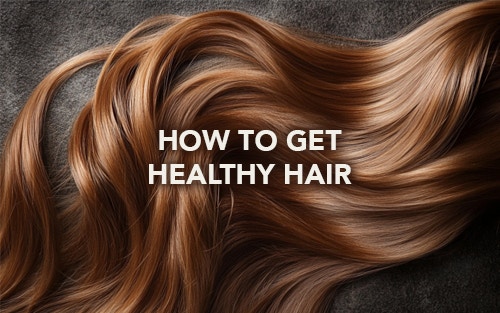
Key Takeaways
- Understanding your hair type is crucial for selecting appropriate products and routines for healthy hair.
- Avoid overwashing your hair to maintain its natural moisture and prevent dryness and damage.
- Incorporating a balanced diet and hydration is essential for promoting healthy hair growth and overall hair health.
Understand Your Hair Type
Identifying your hair type helps you choose suitable products and routines. Hair texture falls into four primary categories: straight, wavy, curly, and coily, each with distinct care needs. Curly or coily hair, for example, typically requires more moisture and less frequent washing because it tends to be drier. Tailoring your product choices to your specific hair type can significantly enhance your haircare routine.
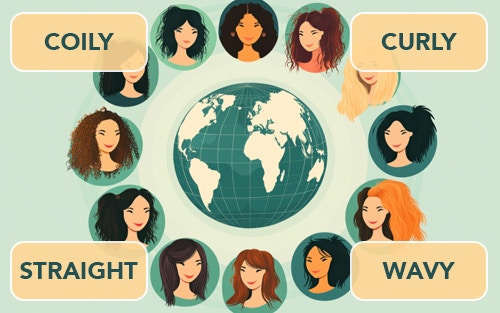
Another important aspect is hair density, which refers to the number of strands on your scalp. This influences not only the choice of products but also styling methods. For example, individuals with dense hair may require more product for adequate coverage, whereas those with less density might need lighter formulations to avoid weighing down their hair.
Your hair condition, whether oily hair or dry, also affects product choices. Select shampoos and conditioners suited to your specific hair and scalp needs for effective cleansing and maintenance. This foundational knowledge sets the stage for a successful haircare routine.
Avoid Overwashing
Balancing your hair-washing routine is key to maintaining healthy hair. Overwashing can strip natural oils from your hair, leading to dryness and damage. Most hair types benefit from being washed a few times weekly rather than daily. This helps to keep your hair’s natural moisture intact, preventing it from becoming dry and brittle.
Washing your hair too frequently can also lead to a buildup of shampoo residue, making your hair look dull and lifeless. Determining the optimal washing frequency for your hair type helps maintain its natural shine and health. Aim for a balanced washing routine that respects your hair’s natural oils and moisture levels.
Incorporating these healthy hair tips into your routine will help you protect and keep your hair healthy. Remember, it’s all about moderation. Overdoing it with hair washing can do more harm than good, so listen to your hair’s needs and adjust accordingly.
Choose the Right Shampoo and Conditioner
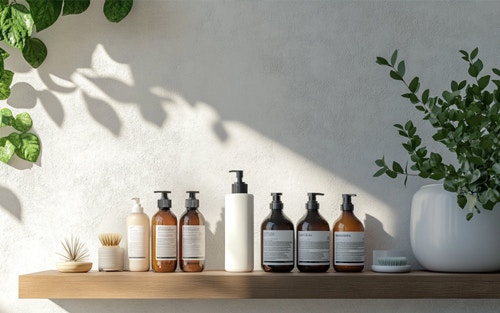
The right shampoo and conditioner form the cornerstone of an effective haircare routine. Steer clear of shampoos with harsh ingredients like ammonium lauryl sulfate or sodium lauryl sulfate, as they can strip natural oils, causing dryness and damage. Instead, opt for silicone-free products that prevent residue buildup and are gentler on your hair. Organic shampoos with plant-based ingredients can also be beneficial, offering gentle yet effective cleansing.
Conditioners are vital for maintaining healthy hair by providing essential moisture and nourishment. Select conditioners based on your hair type to ensure they meet your specific needs. For instance, protein-based ingredients can help strengthen and repair damaged hair, while leave-in conditioners offer continual hydration and manageability.
Specialized products are available for color-treated hair color, designed to protect and enhance vibrancy. People with sensitive scalps should look for sulfate-free shampoos and avoid conditioners with synthetic fragrances to prevent irritation. These thoughtful choices will help maintain your hair’s health and natural shine.
Regularly Use Hair Masks
Hair masks are a fantastic addition to any haircare routine, providing intense conditioning and repair that regular conditioners might not offer. Applying a hair mask weekly helps maintain healthy moisture levels, making your hair more supple and shiny. These treatments are particularly beneficial for repairing damage caused by styling and environmental factors.
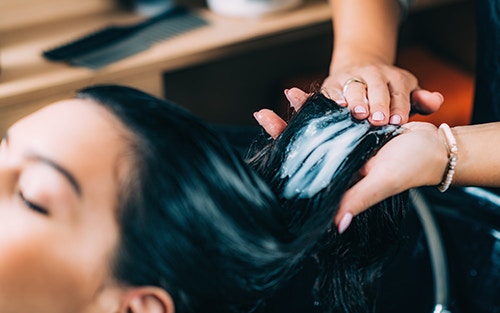
Applying hair masks to damp hair allows for better absorption and maximum benefit. Regular use of a hair mask can significantly repair and strengthen damaged or bleached hair.
Incorporate hair masks into your routine to maintain healthy hair and keep it healthy and well-nourished.
Minimize Heat Styling
Heat styling tools, while convenient, can cause significant damage to your hair if not used properly. Excessive heat can strip your hair’s moisture, leading to dryness, breakage, and split ends. Minimize damage by using a heat protectant before styling and keeping tools at a moderate temperature, ideally between 200-300 degrees Fahrenheit.
Limit the use of hot tools on the same section of hair to just one pass to reduce the risk of damage. Incorporating hair masks into your routine can also provide added protection against heat damage, keeping your hair healthier and more resilient.
Reducing the frequency of heat styling and embracing more natural hairstyles can lead to healthier hair in the long run. These steps help protect your hair from unnecessary heat damage, maintaining its natural beauty and health.
Protect Hair from Environmental Damage

Environmental factors like sun exposure can cause significant damage to your hair, leading to dryness, brittleness, and color fading. Use protective products and accessories like hats to shield your hair from the sun’s harmful rays. Products like Living Proof offer optimal sun protection for your hair.
Pollution and harsh weather conditions can impact hair health. Products designed to protect against environmental damage help maintain moisture and natural shine. Regularly washing your hair to remove pollutants and using deep-conditioning treatments can further protect your hair from environmental stressors.
These precautions help safeguard your hair against environmental damage, ensuring it remains healthy and vibrant.
Be Gentle with Wet Hair
Wet hair is particularly vulnerable to damage, as it is weaker and more prone to breakage. Avoid brushing wet hair to protect it. Use a wide-tooth comb for gentle detangling.
A microfiber towel reduces friction and minimizes damage during hair drying. This simple change in your haircare routine can make a significant difference in maintaining healthy, strong hair.
Get Regular Trims
Regular trims maintain hair health and prevent split ends from worsening. Plan to get trims every 6-8 weeks to maintain your hair’s health and reduce the likelihood of breakage. Trimming every 8-12 weeks is generally recommended for natural hair, depending on the hair’s condition.
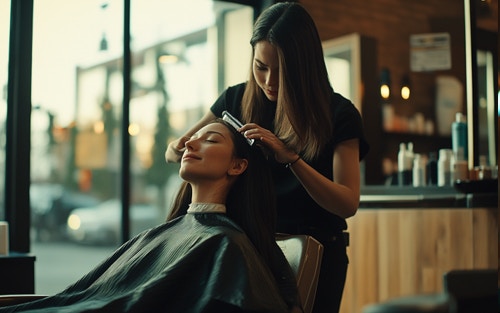
Skipping trims can worsen split ends and increase damage, making healthy hair maintenance harder in the long run. Incorporate regular trims into your haircare routine to keep your hair looking its best.
Maintain a Healthy Diet
A healthy diet is key to maintaining healthy hair. A balanced intake of vitamins A, C, D, E, and B vitamins, along with minerals like iron and zinc, supports healthy hair growth. Protein-rich foods like eggs are essential since hair follicles are primarily made of protein.
Fatty fish like salmon, rich in omega-3 fatty acids, can promote hair growth and overall hair health. Vitamin C-rich foods like berries and sweet peppers protect hair follicles from oxidative stress and promote collagen production. Nuts and seeds provide essential fatty acids, vitamins, and minerals that prevent hair loss and improve hair health.
Hydration is vital for healthy hair; inadequate water intake can cause split ends and brittleness. By incorporating these nutrients into your diet, you can support your hair’s health from the inside out.
Take Care of Your Scalp
Scalp health is key to overall hair health. Regular exfoliation removes dead skin and promotes better hair growth. Using a gentle scalp massage while washing can stimulate blood flow and enhance scalp health.
Moisturizing your scalp prevents dryness and flakiness, reducing the risk of dandruff and other issues. Hydration is crucial, both externally through moisturizing products and internally by drinking sufficient water.
Limit the use of heavy styling products that can contribute to scalp buildup. By taking care of your scalp, you can ensure a healthy foundation for your hair.
Embrace Your Natural Texture
Embracing your natural hair texture highlights its beauty and reduces the risk of heat styling damage. This often results in improved hair strength and elasticity. Transitioning to your natural texture can also save both time and money by reducing dependence on styling tools.
Air drying your hair without manipulation reveals its true texture. Adopting a haircare regimen tailored to your specific curl pattern enhances its natural beauty and health. Embrace your natural hair and enjoy the benefits it brings.
Avoid Tight Hairstyles

Wearing tight hairstyles can place undue stress on hair strands, leading to breakage and hair loss. Styles like tightly pulled ponytails, cornrows, and up-dos can put excessive stress on hair follicles, resulting in potential damage. Longer hair, in particular, can cause additional pulling when styled tightly, increasing the risk of traction alopecia.
Opting for looser hairstyles, like a messy bun or low ponytail, is gentler on hair and reduces the risk of breakage. Opting for gentler styles significantly contributes to maintaining healthy hair and preventing hair loss.
Use Oils for Nourishment
Natural oils can significantly improve hair health and appearance. For instance:
- Coconut oil effectively penetrates the hair shaft and may help repair damage.
- Argan oil is beneficial for dyed hair, conditioning, and protecting against oxidative damage.
- Jojoba oil can moisturize hair and treat dry scalps, reducing hair breakage.
- Sweet almond oil protects hair from UV rays and helps treat dryness and dullness.
These natural oils promote nourishment and moisture, contributing to a healthy shine. Regular use of oils like coconut, argan, jojoba, and sweet almond can enhance your haircare routine and keep your hair healthy and vibrant.
Sleep on a Silk Pillowcase
Silk pillowcases minimize friction during sleep, leading to less breakage and maintaining hair’s moisture balance. This helps prevent dryness and frizz, keeping your hair healthier. To avoid tangling while sleeping, use a silk or silk-alternative pillowcase.

Incorporating a silk pillowcase into your sleep routine is a simple change that can make a significant difference in maintaining healthy hair.
Stay Hydrated
Hydration is essential for a healthy scalp and provides necessary moisture to the hair. Drinking plenty of water keeps both skin and hair hydrated, contributing to softer and healthier hair. Adequate hydration supports overall health, including the health of your hair.
By consciously staying hydrated, you can ensure that your hair remains moisturized and vibrant.
Healthy Hair Summary
Maintaining healthy hair requires a multifaceted approach, from understanding your hair type and choosing the right products to adopting a healthy diet and protecting your hair from environmental damage. Regular trims, gentle handling of wet hair, and minimizing heat styling are also crucial steps. Embracing your natural texture and using natural oils can further enhance your hair’s health.
By incorporating these tips into your routine, you can achieve and maintain beautiful, healthy hair. Remember, healthy hair is a reflection of overall well-being, so take care of your hair and enjoy the benefits it brings.
Healthy Hair Frequently Asked Questions
How often should I wash my hair to keep it healthy?
To maintain healthy hair, wash it a few times per week, as overwashing can strip away natural oils and cause dryness. Adjust the frequency based on your hair type and personal needs.
What kind of shampoo and conditioner should I use for my hair type?
For optimal results, select shampoos and conditioners tailored to your specific hair type while avoiding harsh ingredients like ammonium lauryl sulfate. Look for silicone-free and organic products that cater to your hair’s unique needs.
How can I protect my hair from environmental damage?
To effectively protect your hair from environmental damage, use protective hair products, wear hats, and regularly wash your hair to eliminate pollutants. Consider products like Living Proof for enhanced sun protection.
What are the benefits of using hair masks regularly?
Using hair masks regularly offers intense conditioning and repair, maintaining healthy moisture levels while mitigating damage from styling and environmental factors. For optimal results, it is advisable to apply them at least once a week.
How can I prevent hair breakage when my hair is wet?
To prevent hair breakage when wet, refrain from brushing and use a wide-tooth comb instead. Additionally, opt for a microfiber towel to dry your hair, as it reduces friction and minimizes damage.